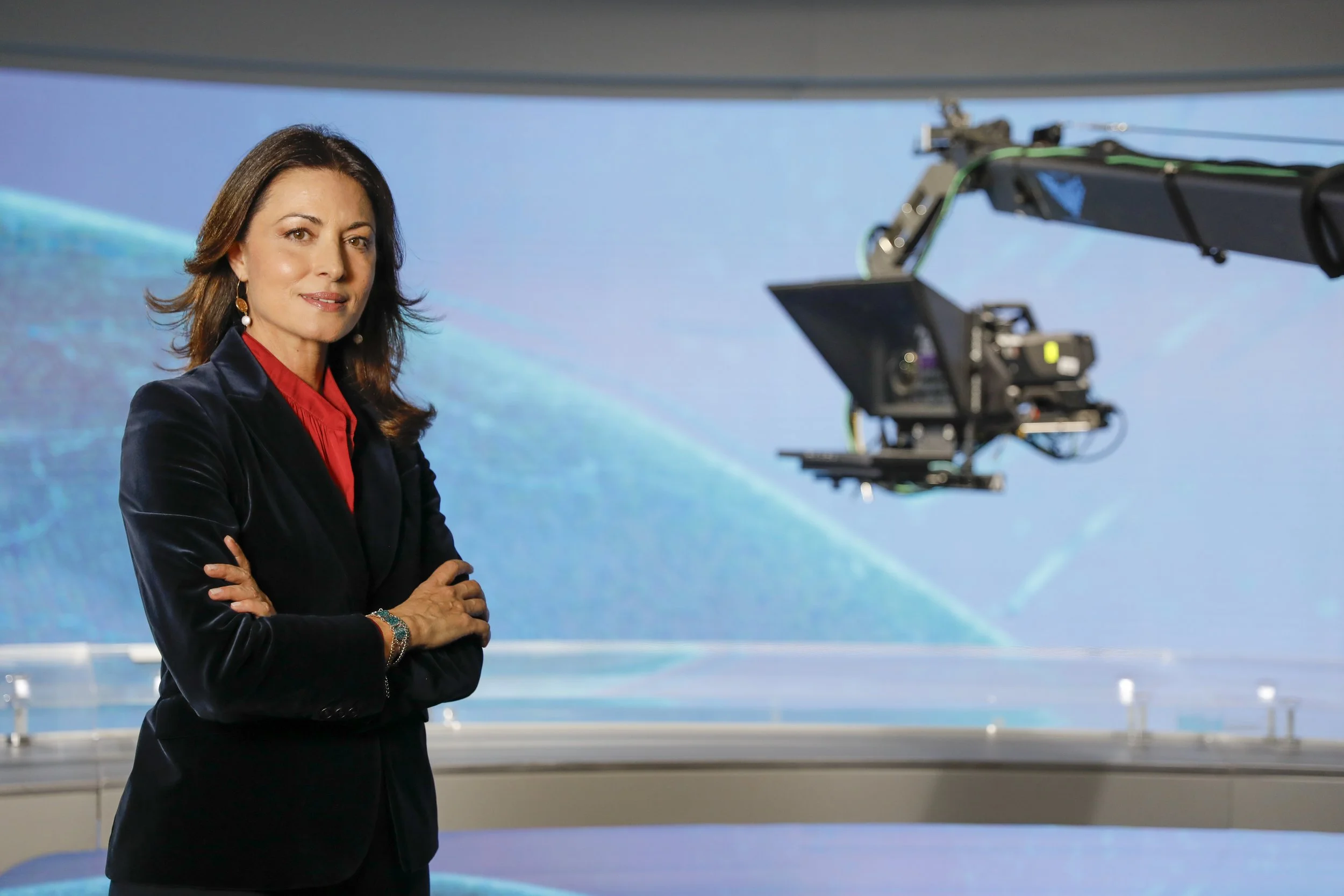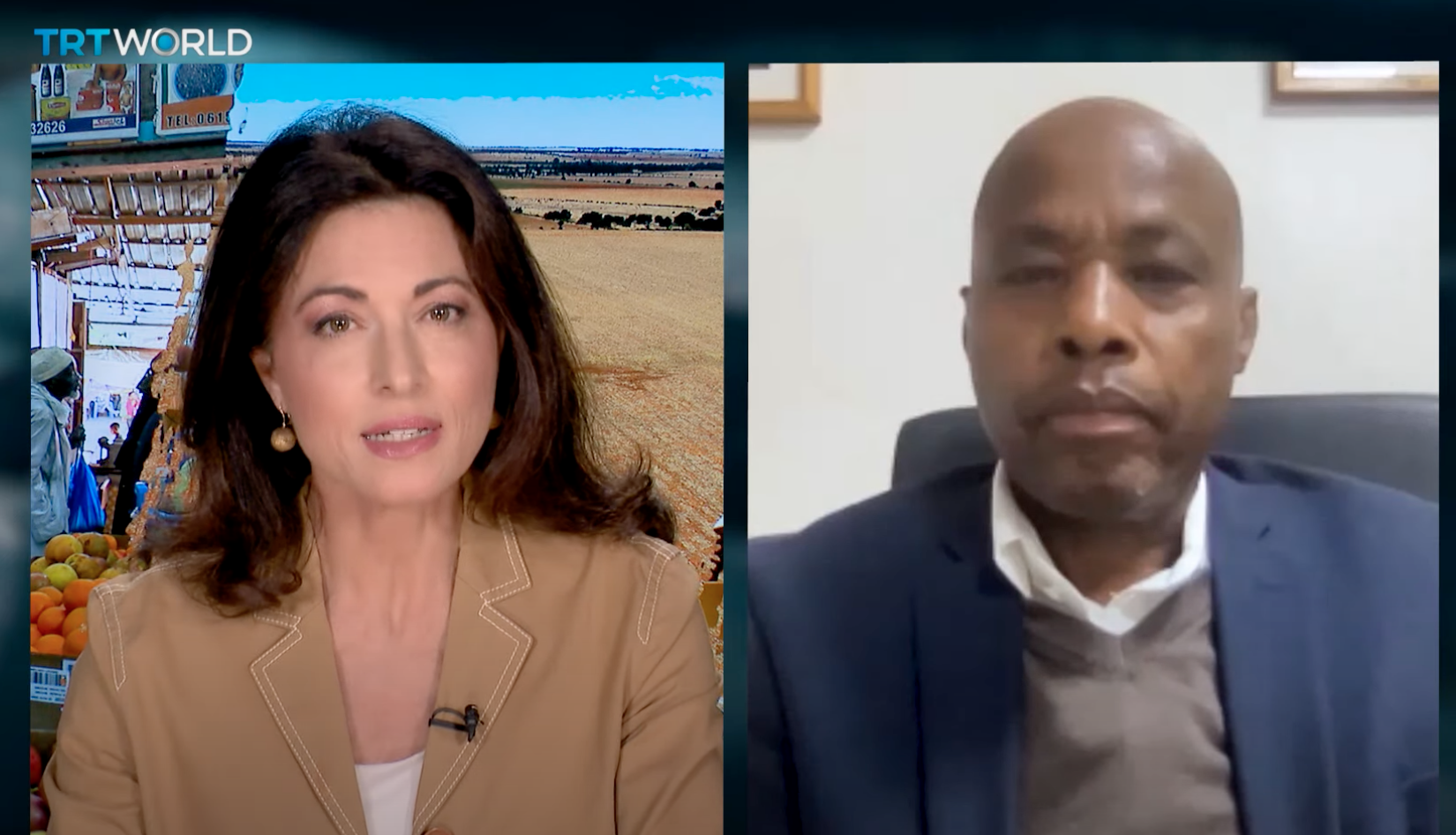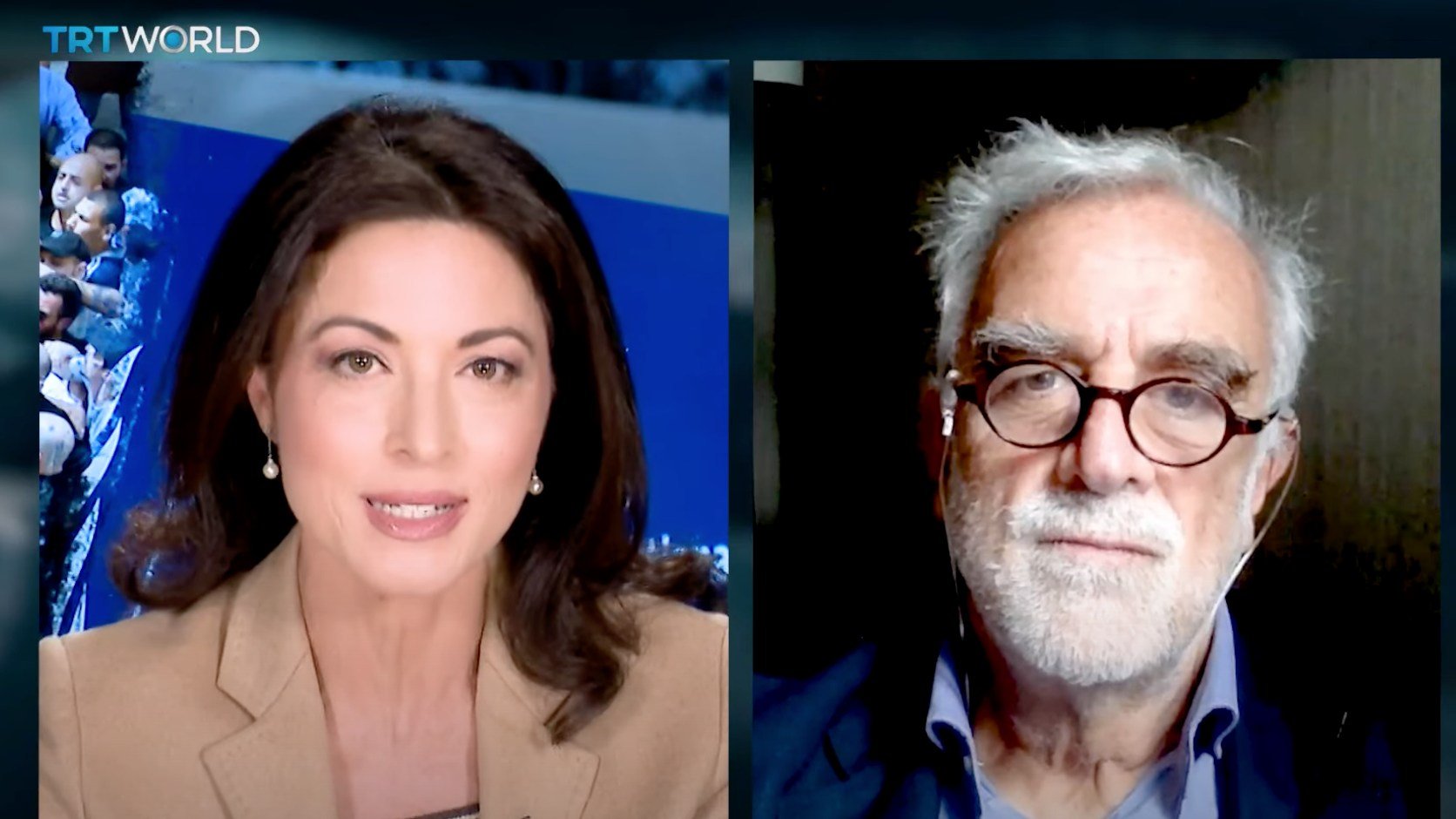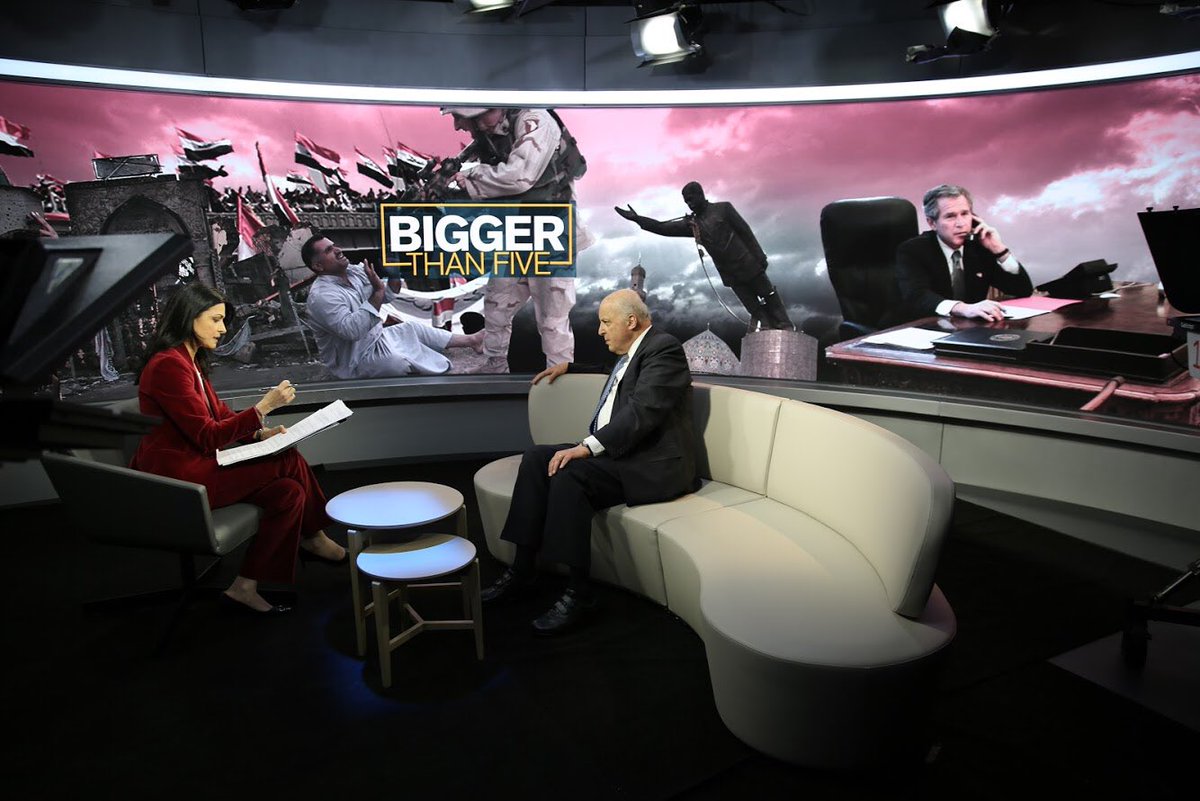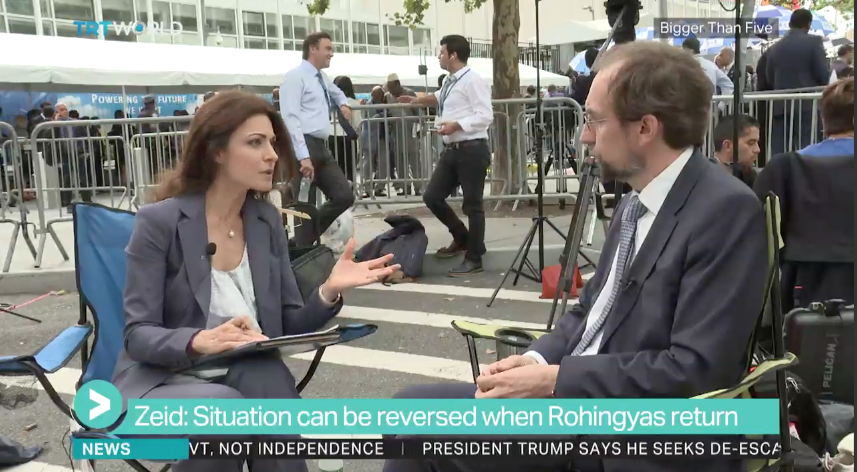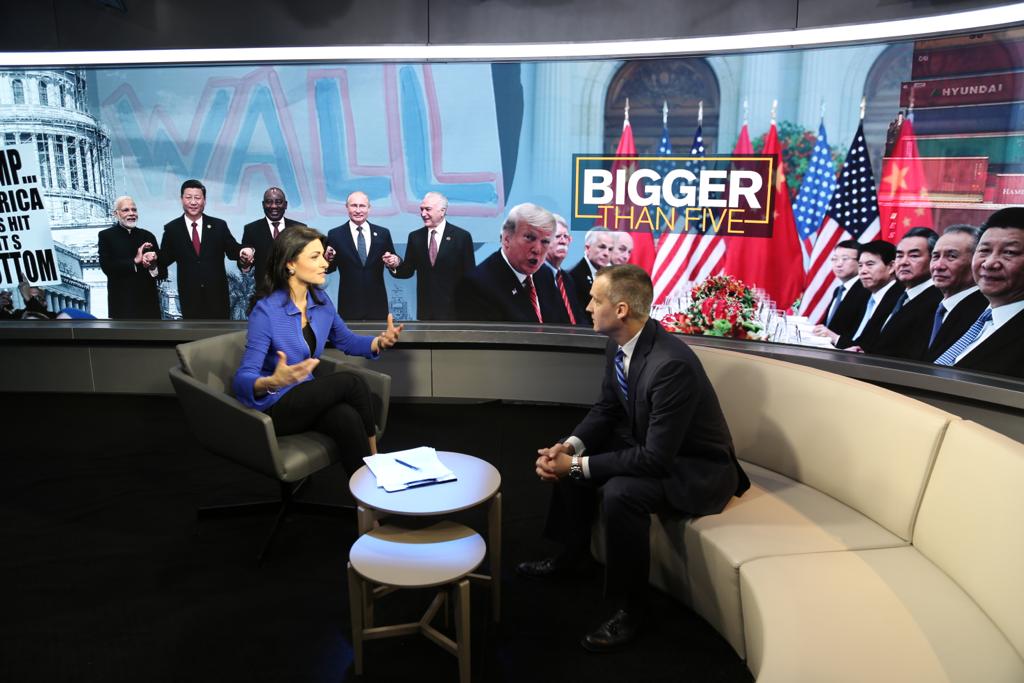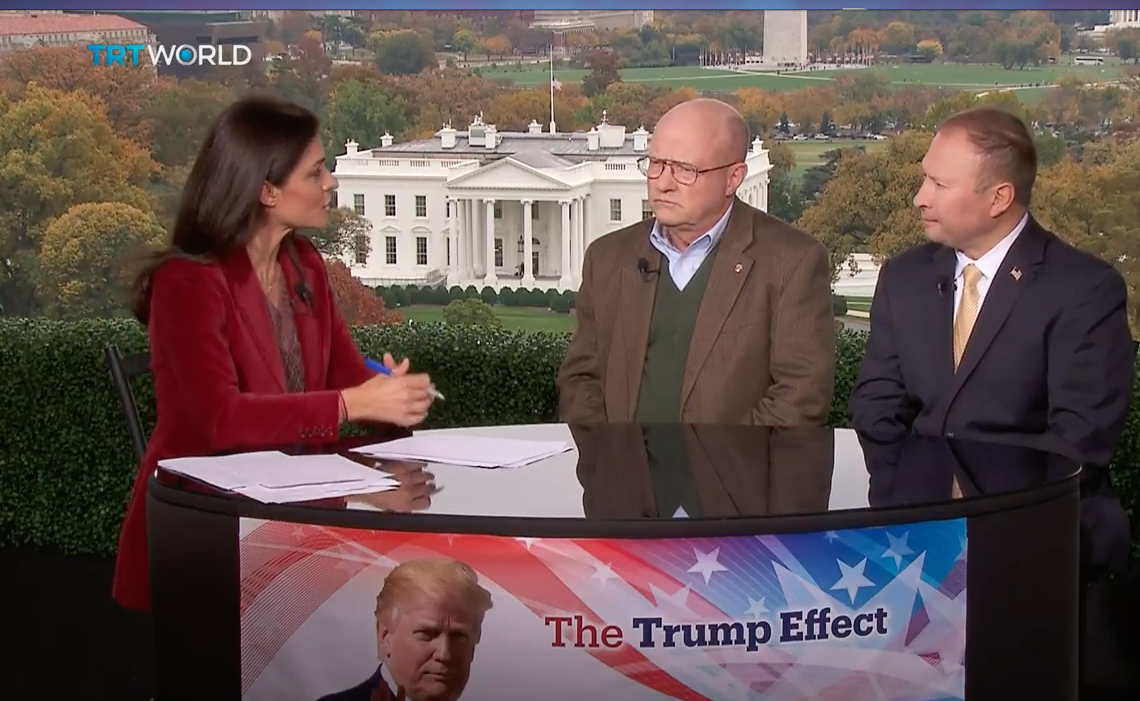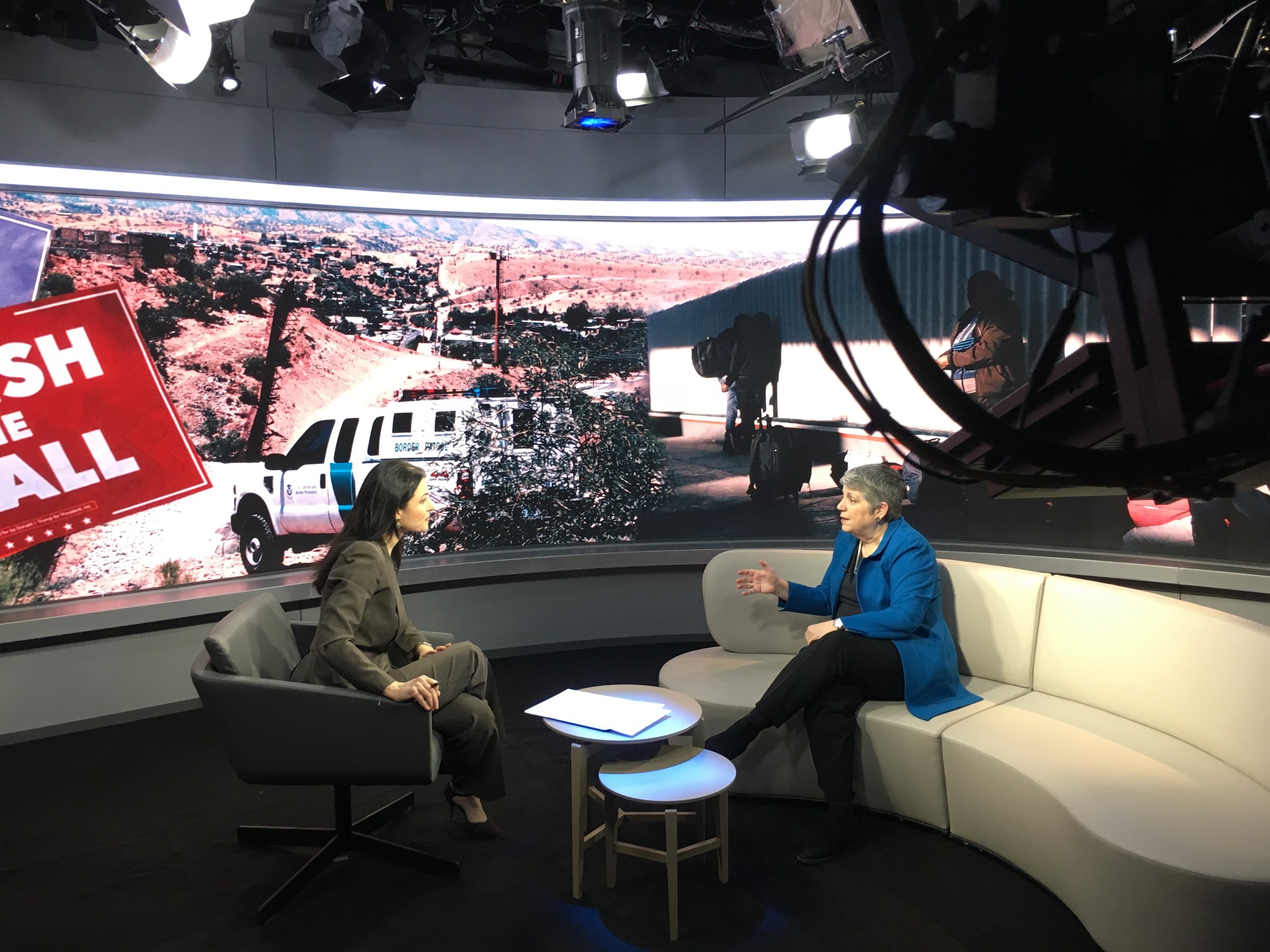Previous Seasons Archive:
China’s New World Order
March 26, 2023
China and Russia vow to cooperate to create a new multipolar world order, accusing the West of undermining global stability —as both countries push back against the United States’ hegemony. Following its major diplomatic breakthrough between Iran and Saudi Arabia, could Beijing be cast in a new role as a global mediator —and power broker?
The War in Ukraine: One Year On
February 25, 2023
As Russia’s war in Ukraine enters its second year with no end in sight and NATO countries continue to pledge more heavy weapons, what are the prospects for a negotiated settlement and peace? Can either side prevail militarily, as the war rages on? And how will the expected delays in deploying US and western battle tanks to Ukraine affect the course of the war? Ghida Fakhry asks a former NATO Supreme Allied Commander on this month’s Bigger than Five.
Brazil’s Return to CELAC
January 28, 2023
As leaders from Latin American and Caribbean countries met for a summit in Buenos Aires, Brazil and Argentina announced plans for a new common currency that would promote regional cooperation. With left-leaning governments coming to power in Brazil and across the region, could this be a new era for Latin America? We speak with the Coordinator of the regional summit that brought together leaders from the 33-member Community of Latin American and Caribbean States —CELAC —and that saw the return of Brazil to the regional bloc.
The Global Energy Crisis
October 30, 2022
As the world faces a deepening energy crisis and Europe braces for a cold winter, how will the hardest-hit oil-importing countries in Africa, Asia and Latin America cope with soaring energy costs and widespread blackouts?
UNGA 77: Interview with Pakistan's Foreign Minister
September 24, 2022
Even as floodwaters begin to recede in Pakistan, outbreaks of diseases such as malaria and typhoid threaten to compound the misery of the more than 7.5 million who are already displaced. Bigger Than Five speaks with Pakistan's Foreign Minister Bilawal Bhutto Zardari about this and other issues on the sidelines of UNGA 77.
Our Planet's Global Warning
July 30, 2022
With just four months until the next annual UN meeting on climate change, and with record-breaking temperatures and heatwaves sweeping across Europe, the US, and other parts of the world, the UN says it is further proof that the world is ‘on a fast track to disaster’ warning that it is ‘now or never’ to limit global warming to 1.5 degrees Celsius.
The World Food Crisis
June 26, 2022
As the war in Ukraine continues and the risk of global food shortages grows, the UN Secretary General warns of an “unprecedented wave of hunger and destitution” if the crisis is not addressed. But can a looming food catastrophe be averted?
Palestine, Israel and the ICC
May 29, 2022
Amid mounting evidence that Israeli soldiers shot and killed a prominent Palestinian-American journalist earlier this month, and the Israeli government’s refusal to conduct a criminal investigation, will the International Criminal Court step in?
Welcoming Ukraine's Refugees
April 30, 2022
The conflict in Ukraine has exacerbated the global refugee crisis and exposed its deep inequalities. With the UN warning that over 8.5 million Ukrainians will become refugees this year, twice its initial estimate, can European countries cope? And how will it affect the tens of millions of refugees who have fled other wars and conflicts —and are still waiting to be resettled?
A Failed Sanctions Policy
February 26, 2022
As the United States and other Western countries impose severe new sanctions on Russia, following its military escalation in Ukraine, sanctions in Afghanistan continue to have a devastating humanitarian impact. So why have sanctions become such a standard feature of US foreign policy?
State of the Pandemic
December 27, 2021
Two years since the first Covid-19 outbreaks, the virus to spread and kill worldwide. As 2021 draws to a close, we take a look at its latest variant, Omicron, and the state of the pandemic. Will governments have to consider a new co-ordinated response?
The Political Journey of FW de Klerk
November 15, 2021
FW de Klerk, the former president of South Africa, who died this week at the age of 85 will be remembered by many for his political courage in dismantling apartheid. But he will also be remembered for his earlier support of and belief in racial segregation system. So, how did the last president of apartheid South Africa see his role in changing the destiny of his country?
Exclusive Interview with Brazil's Lula da Silva
October 30, 2021
He was Brazil’s most popular political leader, a two-time President whose run in the 2022 election against Jair Bolsonaro is widely expected. 20 years after his first election, can Lula da Silva make a political comeback and become President of Brazil, for the third time?
A 'Moment of Truth' for the UN
September 25, 2021
As the UN holds its 76th annual session of the General Assembly, world leaders pledge their renewed commitment to taking collective action to address the world’s pressing challenges. Facing a global pandemic, an ongoing refugee crisis, continuing conflicts and growing mistrust —can the UN still live up to its founding principles —and deliver for people around the world?
US Exit from Afghanistan
July 31, 2021
As the US completes its troop pullout from Afghanistan, the Taliban continue to make gains across the country amid growing questions about the stability of the Afghan government. What are the prospects for real peace among Afghans?
The Plight of Refugees
June 26, 2021
Displaced by war, persecution and natural disaster, tens of millions of refugees have been forced to flee their homes in search of safety. Are we doing enough to protect the most vulnerable among them: children?
The Question of Palestine
May 29, 2021
Amid a fragile ceasefire in Gaza and ongoing Israeli military raids in occupied East Jerusalem, US Secretary of State Antony Blinken returned to Washington this week after meetings with Israeli Prime Minister Benjamin Netanyahu and Palestinian Authority President Mahmoud Abbas. Blinken announced the US will reopen its consulate in Jerusalem which was closed by Trump — a move of little significance unless Washington withdraws is recognition of Israeli sovereignty over East Jerusalem, in line with international law. Blinken also said the US would provide $112 million for the reconstruction of Gaza, bringing the total aid to $360 million. This while the State Department has approved a 735 million dollar sale of weapons to Israel, bypassing congressional approval. So, after 11 days of intense bombing and a tenuous ceasefire —will the renewed diplomatic activity break the political gridlock in Israel and occupied Palestine?
Changing the Climate
April 24, 2021
The United States takes center stage in the fight against the climate crisis, as dozens of leaders attend its first virtual climate summit. But are their lofty commitments grounded in reality? And will they help keep the most vulnerable afloat?
Crisis at the US-Mexico Border
March 27, 2021
President Joe Biden is facing a growing crisis at the US-Mexico border, with the influx of thousands of unaccompanied minors from Central America—a surge that is on pace to become the ‘largest in the last 20 years’ according to the Department of Homeland Security. Over the last three weeks, US government data shows that on average, more than 500 unaccompanied minors have been crossing into the United States every day. The Secretary of Homeland Security, Alejandro Mayorkas, himself a refugee from Cuba, said the southern border is now ‘closed’. But is the Administration sending the wrong signals to those seeking asylum by promising ‘a fair and humane’ policy?
Myanmar’s Military Takeover
February 28, 2021
Protests in Myanmar continue as a military coup challenges the country’s path towards democracy. Will outside pressure bring an end to human rights violations or will impunity —once again— prevail?
Tawakkol Karman on US Policy in Yemen
January 30, 2021
A decade after the start of the Saudi-led war on Yemen, with the active intelligence and logistical support of the Obama-Biden administration and multi-billion-dollar US weapons-sale to Saudi Arabia and the UAE under the two previous administrations, what are the prospects for real change under President Biden? 2011 Nobel Peace Prize Laureate, Tawakkol Karman, joins Ghida Fakhry on Bigger Than Five.
Vaccine Nationalism
November 29, 2020
Recent breakthroughs in COVID-19 vaccine trials in the US, UK, Russia and China have raised hopes that the spread of the coronavirus pandemic, which has already killed almost 1.4 million people worldwide, could soon be contained, and eventually ended. But these breakthroughs have also raised concerns about the access and availability of vaccines for developing nations, with high-income countries claiming a disproportionate share of vaccine doses, often in significantly higher numbers than the size of their populations. So what are the prospects for the rest of the world?
Reviving the Iran Deal
October 31, 2020
Voters in America are choosing their next president, as people and governments around the world anxiously await the outcome of the US election which could have a consequential impact on their own lives. One country that is looking on with a particularly keen interest is Iran. President Trump has led a “maximum pressure” campaign on Tehran by imposing unprecedented sanctions after pulling out of the Iran Nuclear Deal. His rival Joe Biden has called that policy “reckless” and said his administration would change course. So just how different will US-Iran relations be under a Trump or Biden presidency?
'Peace Deal' or Arms Race?
September 26, 2020
It was hailed by President Trump as “a historic breakthrough”. Israel and two Arab Gulf nations, the United Arab Emirates and Bahrain, signed bilateral agreements at the White House last week establishing full diplomatic relations. The so-called Abraham Accords, which were described by the US President as a “significant step towards building a more peaceful, secure, and prosperous Middle East”, reinforce the anti-Iran axis in the Gulf region. They also pave the way for the UAE to purchase F-35 stealth fighter jets, drones and other advanced weaponry from the United States. While Israel already flies 20 F-35s, the UAE would be the first Arab country to receive the American-made fighter jets. Some Israeli intelligence officials have voiced their concerns about the US commitment, enshrined in a 2008 law, to ensure that Israel maintains a “qualitative military edge” in the Middle East. Others warn that it will spark a regional arms race. So what would the US move to supply more sophisticated weapons to Gulf states mean for the stability of the wider region?
The UN at 75
August 29, 2020
75 years after the establishment of the United Nations to ‘save succeeding generations from the scourge of war’, has the UN lived up to its ideals? The United Nations marks its 75th anniversary this year. The organization has faced many crises over its three-quarter century-long history. But this September, because of the pandemic, the annual session of the General Assembly won’t be held at UN headquarters. Instead of flying to NY for this ritual, Heads of State and Government, will deliver their speeches online under the theme: “reaffirming our collective commitment to multilateralism”. With growing trends towards isolationism and unilateralism in some parts of the world, including the host country, the United States, will this amount to little more than diplomatic talk?
The Case for Reparations
July 25, 2020
As the calls for racial justice get louder throughout the world, is it time for colonial powers and slave trading countries to atone for their sins by paying reparations? Mobilized since the death of George Floyd, a black man killed by a white police officer in the US, the world has witnessed a reawakening over systemic racism. Growing demands for racial justice have renewed the debate about apologies and reparations by former colonial powers and slave-trading countries to make amends for their crimes and past injustices. In the US, symbols of slavery and colonialism have been brought down, from statues of Confederate leaders to colonizer Christopher Columbus. The name of a former transit point for the transnational slave trade on Senegal's Goree Island, was changed from Europe Square to Freedom and Human Dignity Square. But this racial reckoning is evolving into a debate over what true reconciliation looks like. So are former colonial powers and slave-trading countries ready and willing to pay?
Annexing Palestine
June 27, 2020
Facing mounting international pressure, will the Israeli government push ahead with its annexation plan with the full backing of the United States? And at what cost? The Secretary General of the United Nations has warned that this would constitute ‘a most serious violation of international law’ and called on the Israeli government to abandon its annexation plans. Meanwhile, more than 1000 members of European Parliaments signed a letter denouncing Israel’s plans. Ahead of its July 1st target date, the Netanyahu government is holding talks with the Trump administration on a ‘gradual annexation’. In retaliation, the Palestinian government is threatening to withdraw from all bilateral agreements with Israel. Will Netanyahu follow through on his threat? And what impact will it have on Palestinians?
Afghanistan's Long Road to Peace
May 30, 2020
A ceasefire, a peace deal and a power-sharing agreement. Is Afghanistan ready for lasting peace? Or will a US troop withdrawal spark new conflict? Afghanistan remains on edge as a tenuous peace deal between the United States and the Taliban is expected to bring an end to nearly two decades of war. There was some hope over the Eid holiday, when a 3-day ceasefire was observed by both the Afghan government and the Taliban. This came on the heels of a power-sharing agreement between President Ashraf Ghani and his long-time rival Abdullah Abdullah, after both men claimed victory in last September’s election. So, is the US withdrawal a victory for the Taliban? And can Afghans work together towards a common goal?
COVID-19: Economic Relief
April 22, 2020
The rapid invasion of the coronavirus is exposing the weaknesses and inequalities in our social and economic structures. Will its dramatic impact be a fleeting moment, or will it force a fundamental rethink of our systems?
COVID-19: War & Conflict
April 15, 2020
The coronavirus pandemic has hit some of the world's wealthiest countries the hardest, so far. The United States, the world’s largest economy, has the highest number of recorded infections. Among the 30 countries most affected, the majority are in the developed world. But the virus has also spread to developing countries; countries with weak health systems and countries marred by years of conflict. So as the fight against the pandemic continues, it is the world’s vulnerable people and nations that will bear the brunt. Will wealthier countries, themselves struggling to contain the virus, come to their rescue? And what will be the impact on those already affected by war and conflict?
COVID-19: A Future in Question
April 8, 2020
The Coronavirus pandemic is consuming lives and our global economies--and for some of us, our jobs. All we can do is think-- what’s next? What will the short term and long term future look like? Will it get better? And how soon can we expect a vaccine?
COVID-19: The World Reacts
April 1, 2020
The Coronavirus pandemic is sending many countries around the world into lockdown and putting immense pressure on their healthcare systems. So how are different parts of the world dealing with this global crisis?
COVID-19: The US Response
March 25, 2020
The coronavirus pandemic is taking lives, jobs and challenging governments worldwide. In the US, it was a delayed fight for containment. With all 50 states now reporting cases of COVID-19, federal and local governments are scrambling, preparing for the worst. President Trump says he’s at war. Could we have seen this coming? And could this new invisible threat change the world as we know it?
Trump’s Middle East “Peace”
February 28, 2020
With less than a week to go before Israel's next parliamentary elections, the fallout from the Trump administration's Middle East plan continues. The latest polls show that almost 95% of Palestinians reject the plan, while nearly 50% of Israelis believe it amounts to US intervention in their elections to help Prime Minister Benjamin Netanyahu's Likud party win over the opposition on March 2nd. So, is Trump's Middle East plan a serious effort at peace-making between Israelis and Palestinians? Or a crude attempt at bolstering his and Netanyahu's re-election campaigns?
South Africa: 30 Years On
February 12, 2020
30 years after Nelson Mandela was freed from prison, has South Africa been able to fully break free from the shackles of apartheid? Or does its legacy live on? Guests: F.W. de Klerk- President of South Africa (1989-1994) Mandla Mandela- Grandson of Nelson Mandela and Member of Parliament of South Africa representing the African National Congress
State of Surveillance
January 30, 2020
We’re encouraged to tag our photos on social media and use our face to open our phones. Governments are scanning crowds to find suspected criminals and missing people, but also to surveil activists, protesters and ethnic minorities. Facial recognition is rapidly expanding, but will its unregulated use create a new technological wild west? Have we found the balance between privacy, human rights and safety?
Buying America’s Election
January 23, 2020
It is estimated that spending on the next US presidential election could be as high as 10 billion dollars. A landmark US Supreme Court ruling 10 years ago changed campaign finance laws by allowing unlimited amounts of private money to be injected into the American electoral system. The ruling in the Citizens United v. Federal Elections Commissions case argued that placing limits on election spending by corporations or special interest groups violates the US Constitution's First Amendment right to free speech.
The US-Iran Standoff
January 16, 2020
From 'imminent threat' to 'deterrence'. The US shifts its narrative to justify the killing of a top Iranian general, now saying it was part of a bigger strategy. But does the Trump administration have a coherent policy on Iran? And where will it lead?
Rwanda’s Kagame
January 8, 2020
President Paul Kagame has spearheaded a remarkable rebuilding effort in Rwanda following the 1994 genocide that killed nearly 1 million people. He is credited with healing the country and producing an economic miracle. But his re-election in 2017 was not without critics. After more than two decades in power, is Kagame's political longevity his worst enemy? I sat down with President Kagame in Doha.
Poverty in America
December 25, 2019
Income inequality in America has reached its lowest levels in 50 years — but will voters do anything about it in 2020? Bigger Than Five interviews UN special rapporteur on extreme poverty Philip Alston.
Blowing the Whistle
December 18, 2019
An anonymous whistleblower has triggered the third ever impeachment inquiry into a sitting president in the United States. The vitriol from one end of the political spectrum and praise from the other has renewed a global conversation about the role of the whistleblower. They expose wrongdoing, fraud and abuse. But around the world, whistleblowers face government retaliation. Are whistleblowers criminals who leak sensitive state secrets and deserve to face persecution? Or are they heros of transparency, who deserve protection?
Righting Human Wrongs
December 11, 2019
Protesters around the world are calling out corrupt leaders. They demand accountability and justice. But can people’s fundamental human rights be upheld in countries where heads of state themselves are marred by corruption?
America’s Forgotten Colony
December 4, 2019
Another referendum on statehood for Puerto Rico is planned for 2020. But will it change anything or be taken seriously by the US Congress?
Algeria’s New Revolution
November 28, 2019
Algerians have been demonstrating for nearly a year — but will they bring down their regime?
Iraq Under Pressure
November 20, 2019
For the second month, Iraqis across the country have joined in the biggest anti-government protests yet. What started out as general discontent over unemployment, lack of services, and widespread corruption quickly turned into a rejection of Iraq's ruling class and a demand to overhaul the country's entire political system, which has been in place since the 2003 US invasion. But facing a bloody repression, will protesters' demands for meaningful change succeed?
UN Going Bankrupt?
November 14, 2019
The UN says it is quickly running out of cash because many of its member states have not paid their annual contributions. With just over 70% of contributions to the UN's regular budget paid, member-states still owe the organization $1.2 billion for this year. More than 130 million people across the world rely on humanitarian assistance and protection from the UN. The United States, which is the UN’s largest contributor, recently paid the organization $180 million to relieve some of the financial pressure but still owes close to a billion dollars.
Chile’s Awakening
November 7, 2019
Chile may have been considered one of the great economic success stories of Latin America, but for the past three weeks, the country’s free-market economic model has been under attack by hundreds of thousands of protesters demanding an end to the high cost of living and inequality in the country. Protesters are calling for billionaire President Sebastian Piñera, to step down, despite promised economic and political reforms. What is the way forward?
Lebanon Revolts
October 31, 2019
The resignation of Lebanon's Prime Minister, Saad Hariri, after two weeks of anti-government protests, has left the country at a critical juncture. Hundreds of thousands of Lebanese citizens from all walks of life joined the country's biggest protest movement yet, accusing the country's political elite of rampant corruption and economic mismanagement. So now that the head of government has resigned, what is next for one of the most indebted countries in the world?
Turmoil in Haiti
October 24, 2019
Anti-government protests in Haiti have continued to rock the capital of Port-au-Prince. Protesters are calling on President Jovenel Moise to step down, blaming him for fuel shortages, corruption and rising inflation. The President who was elected in 2017, insists that he will continue to serve out the remainder of his five-year term in office. Has Haiti reached its breaking point?
The First Americans
October 17, 2019
Bigger Than Five speaks with Kimberly Teehee, the Cherokee Nation’s delegate to the US House of Representatives and a former Obama administration official as we look at the fight of Native Americans for environmental justice and civil rights.
Trump’s Syria U-Turn
October 10, 2019
By pulling out of Syria, is the US handing victory to the Russians? The last US Ambassador to Syria, Robert Ford, gives his take on Trump’s move on this week’s Bigger Than Five with Ghida Fakhry.
Guantanamo forever?
October 3, 2019
The US has held prisoners of war and tried terrorism suspects on US soil -- so why is it necessary to continue holding people at Guantanamo?
Stopping Africa’s Migrants
September 26, 2019
Faced with pressure from humanitarian organizations, the EU is meeting to broker a deal to overhaul the bloc’s immigration policies. Meanwhile, the European Commission has come under criticism for creating the position of Vice President for “Protecting Our European Way of Life”. What legal-and humanitarian- obligations does Europe have in managing migrant flows? Is externalizing border control to Africa the way forward?
Israel’s Apartheid Democracy
September 19, 2019
Bigger Than Five looks at Israel's democratic process as voters go to the polls for the second time this year to elect a parliament.
America’s Unauthorized Wars
September 11, 2019
Eighteen years ago this week, the US Congress passed a resolution giving the American president what some are now calling 'a blank cheque' to wage war. The 2001 Authorization for Use of Military Force, or AUMF, empowered the President to use “all necessary and appropriate force” against the perpetrators of the 9/11 attacks and those who harbored them. Will Congress take back its war authority -- or will it stand by as the bombs continue to drop?
Modi’s Kashmir Gamble
September 4, 2019
It has been more than 4 weeks since India's decision to revoke the decades-old special status of Jammu and Kashmir, by rescinding Article 370 of the constitution, which granted the disputed territory limited autonomy since 1947. Some protests in the Kashmir Valley have turned violent, with many Kashmiris anxious that Delhi’s unilateral move is intended to change the demographics of the state, from majority-Muslim to majority-Hindu. So is Prime Minister Modi gambling on Kashmir -- and Indian democracy?
Climate Crisis?
July 17, 2019
2018 was the fourth warmest year on record. According to the Intergovernmental Panel on Climate Change, if we want to prevent the world from warming more than 1.5℃ by 2030, global greenhouse gas emissions would need to fall by 45% from 2010 levels. What’s at stake if we don’t act now?
Russia’s Return
July 10, 2019
Is Russia outperforming the US in the race for global influence? That is the latest assessment from the Pentagon. But is the Russian threat being exaggerated to suit certain military and political interests? On this week’s Bigger than Five, we ask: Has President Trump set the stage for Russia’s return and the revival of a multipolar world order?
China Rising
July 3, 2019
China’s growing global economic influence has disrupted the US-led world order. With four decades of economic growth, China has refused American demands for structural changes to its economic model. The Trump administration's decision to confront China with an aggressive trade agenda has left the global economy on edge. Is the spat really about ensuring fair competition? Or is the US trying to block China's rise?
End of Daesh (ISIS)?
June 27, 2019
US President Donald Trump says Daesh or ISIS has now been "obliterated". Despite its territorial losses in Syria and Iraq, has the group been 100 % defeated, as the American President claims -- or is the fight still far from over?
Refugee Fatigue?
June 19, 2019
The world took notice of the plight of refugees after Syrians began streaming into Europe in 2015. But while refugees are no longer appearing in the headlines, their plight endures. Are the global powers taking notice? What can they do to lessen the load on developing nations?
Brexit: Deal or no Deal?
June 12, 2019
Nearly three years after the United Kingdom voted to leave the EU, and after three failed attempts to push a deal through Parliament, there is still deadlock and uncertainty about how to deliver BREXIT. Theresa May’s successor as Prime Minister will have to find a way out of the crisis. So, will the UK walk out of the European Union without a deal? We speak with Ann Widdecombe, newly-elected MEP for the BREXIT Party and former Conservative party member, about the chances of the UK leaving the EU by the October 31st deadline, with or without a deal.
The Rise of Far-Right Populism
June 5, 2019
With the rise of far-right nationalism, are we seeing the beginning of a new global movement that threatens to disrupt the international order? From Italy to India, from the Philippines to Brazil, the specter of right-wing populism is spreading. But are populist leaders delivering on their promises by addressing the legitimate concerns of their citizens — or are they merely capitalizing on exclusionary politics, disruption and division?
Trump’s Iran War?
May 29, 2019
Is the US setting the stage for military conflict with Iran? As tensions rise between the two sides, will the tug-of-war lead to an open war? The Trump administration is deploying an additional 1500 military personnel and a dozen fighter jets to the Middle East. With Trump warning that it would be the ‘official end of Iran’ and the US National Security Advisor advocating ‘regime change’, a new war in the Gulf cannot be ruled out. We ask Tom Shannon, former US Acting Secretary of State, about the conflicting signals from the Trump administration.
Venezuela’s Power Struggle
May 23, 2019
Venezuela's downward economic spiral and humanitarian crisis continues, amid an ongoing power struggle between President Nicolas Maduro and Juan Guaido, the self-declared interim president. Guaido's call for Venezuelans to overthrow Maduro last month failed. Can Venezuela overcome its worsening economic situation and sustain the ongoing threats of Washington's gunboat diplomacy?
Deal of the Century?
May 16, 2019
Is Jared Kushner’s much-hyped and long-awaited ‘deal of the century’ a genuine peace offer? Does a plan that does not include statehood for Palestinians stand any chance? Could its failure embolden Netanyahu and give him a pretext to annex more territory? We look at the divide between East and West Jerusalem and ask people thee what they think about the prospects for peace.
People Power
May 9, 2019
Can people power in defeat authoritarian rule? Millions of protesters in the Sudan and Algeria brought down their countries’ strongmen, across two of Africa's largest countries have toppled their country's strongmen. But will they break the military’s grip and push back foreign meddling? We take a look at the powerful popular uprisings shaking the two largest African and Arab countries.
America’s Longest War
May 2, 2019
With another round of talks between the US and the Taliban underway in Doha, what are the chances of a breakthrough? I ask the Taliban spokesman why the group is willing to negotiate with the US, which still has 14,000 troops in Afghanistan, but refuses to sit down with the Kabul government. Does the American decision to engage directly with the Taliban undermine the Afghan government’s authority and legitimacy? I ask an Afghan official in Washington and a former US Ambassador to Afghanistan.
The ‘World’ Bank
April 24, 2019
The World Bank’s stated mission is to alleviate poverty – but does it really live up to its goals? On this week’s BT5, we take a look at a $600 million dam project in Lebanon, funded by the World Bank, that locals say is dangerous, costly and unnecessary. I ask the Vice President of the WB for the Middle East and North Africa, Ferid Belhaj, why the Bank is pushing these risky projects on developing countries when the industrialized world is moving away from them.
The End of NATO?
April 17, 2019
70 years after the signing of the North Atlantic Treaty, is NATO a source of stability or a threat to international peace and security? On this week’s BT5, we examine whether the Alliance has outlived its purpose.
With the resurgence of intra-Libyan warfare, I ask the former head of US Central Command, Adm. William Fallon, if the 2011 NATO intervention in the country made the situation even worse.
The Business of War
April 10, 2019
The United States is the world’s largest producer and exporter of weapons. It claims to be judicious in providing them to allies. But is that true? American-made bombs are being used in the Saudi-UAE’s war on Yemen. Should the US be held accountable for arming its allies in their relentless bombing? I ask former US Secretary of Defense, Leon Panetta. We also meet some of the victims in Yemen and travel to Arizona where activists are tirelessly protesting outside a major US weapons factory.
Immigration: The Politics of Fear
April 3, 2019
Does the politics of fear drive the immigration debate in the US? Is it fuelling the rise of white supremacist nationalism? On this edition of BT5, I ask former US Secretary of Homeland Security, Janet Napolitano, about the alleged crisis a the US-Mexico border, and whether Trump is not in fact building on Obama’s immigration policy.
America’s Pro-Israel Lobby
March 27, 2019
With top Democratic presidential candidates boycotting AIPAC's annual conference this week in Washington DC, we ask: is the power of the pro-Israel lobby in the US beginning to fade — or does the pro-Israel lobby still wield the power it once did? We speak with the former Executive Director of AIPAC, Tom Dine, and Republican Congressman Brian Fitzpatrick about the lobby’s influence on US politics. We also discuss Trump’s decision to recognize Israel’s sovereignty over the occupied Golan.
Iraq: What Next?
March 20, 2019
On the 16th anniversary of the US-led invasion of Iraq, we look at he legacy the US left behind and the challenges the country continues to face as it tries to re-build following a three year battle with ISIS. Did the US deliver when it promised to replace Saddam Hussein’s oppressive regime with a stable democracy? Is the future of Iraqis looking any brighter? I ask the first US Ambassador to Iraq post-2003, John Negroponte, if he has any regrets and whether the US-led war was a mistake — and a crime of aggression.
America In Decline
March 13, 2019
Our first episode explores the decline of the US as a superpower and looks at who will fill the leadership void. What impact has President Trump’s ‘America First’ policy had on the US’ global influence? We speak with Trump’s former Campaign Manager Corey Lewandowski, the Dean of SAIS Vali Nasr and the former NSC Chief of Staff Fred Fleitz. We also look at how AI and emerging technologies will define the new global pecking order. Ana Rold, Publisher of Diplomatic Courier, gives us her take.
